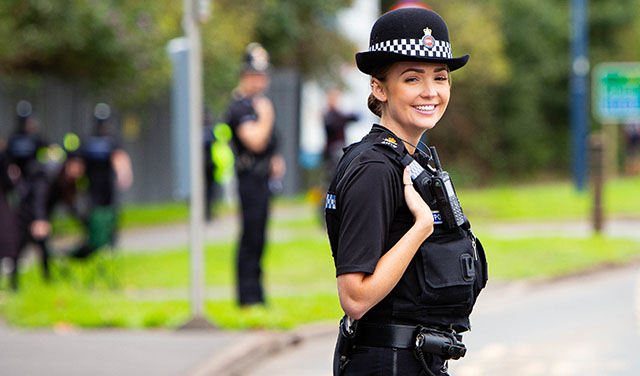
Police officers protect the public from crime while supporting crime victims and witnesses and providing comfort to local inhabitants.
As a police officer, you will work with the communities you serve to maintain law and order, protect the people and their property, prevent crime, reduce crime fear, and improve the quality of life for all citizens. You’ll use a range of technology to protect people, identify criminals, and ensure successful prosecutions of those who break the law.
Police officers work closely with members of the criminal justice system, social workers, schools, local businesses, health trusts, housing authorities, town planners, and community organisations.
Responsibilities
Throughout your apprenticeship, you may help:
- respond to calls for help from the public
- investigate crimes and offences
- interview suspects and make arrests
- give evidence in court
- control traffic and crowds at large public events and gatherings
- advise the public on personal safety and crime prevention
- promote respect for people in relation to their race, diversity and human rights.
Salary
- The starting salary for an apprentice police constables in England, Wales and Northern Ireland is £21,402
- Rising to £41,130 at the top of the scale – achievable after about seven years.
- In Scotland apprentice starting salaries are slightly higher at £26,737, rising to £41,578 after about ten years’ service.
- The range of salaries for sergeants is £43,965 to £46,227.
- Inspectors can earn between £52,698 and £57,162 (£56,496 in London), rising to between £58,332 and £60,732 for chief inspectors (£60,654 in London).
Working hours
Full-time police officers work 40 hours a week on average, split into eight-hour shifts. However, unsocial hours, shift work, and emergency call-outs are prevalent since police officers provide a 24-hour public service. Regular shifts are usually at most 10 hours long; however, overtime may be available.
Working environment
You could work on a patrol or at a police station.
Your working environment may be outdoors in all weathers and physically and emotionally demanding.
You may need to wear a uniform.
Qualifications
Qualifications you can achieve as an apprentice police officer include:
- Level 6 Police Constable – Entry requirements for this level include 4 or 5 GCSEs at grades 9 to 4 (A* to C) and A levels, or equivalent, for a degree apprenticeship.
It’s a 3 year work-based programme that leads to a degree in Professional Policing Practice.
Skills
On a police officer apprenticeship, you’ll learn:
- legal knowledge including court procedures and government regulations
- knowledge of public safety and security
- negotiation skills for keeping people safe
- patience and the ability to remain calm in stressful situations
- sensitivity and understanding for dealing with traumatic situations
- the ability to understand people’s reactions
- excellent verbal communication skills
- leadership skills
- to be able to use a computer and the main software packages competently.
Employers
There are currently 45 police forces in the UK:
- 43 services in England and Wales
- one single force in Scotland (Police Scotland)
- one service in Northern Ireland (Police Service of Northern Ireland).
Other areas of employment include specialist forces, such as the:
Professional development
Probationary training is required for all new police officers. In line with degree completion, probation lasts two years for persons on the degree-holder and pre-joining degree tracks and three years for those on the degree apprenticeship route.
Depending on your career, you will get training that includes classroom lectures, role plays, and practical sessions. When you’re out on patrol, you’ll be coached by an experienced tutor constable who will help you improve your practical skills. Then, during your probationary period, you will return to the classroom to learn new skills and complete courses and tasks.
Graduates of the two-year Police Now programme go through a rigorous six-week summer academy before commencing a week of in-service training. Following that, you will be matched with a police officer who will act as your mentor for an 8-12 week immersion period. You will be put in some of the toughest neighbourhoods, allowing you to build strategies and ideas for coping with a wide range of challenges.
Police officers are required to get ongoing training throughout their employment, and there is a significant emphasis on regular supervision, help, and support.
Career prospects
Police officers have various employment opportunities after completing the probationary period. Police officers have a well-defined rank structure, and there are opportunities to progress to more senior positions:
- police constable
- sergeant
- inspector
- chief inspector
- superintendent
- chief superintendent
- assistant chief constable
- deputy chief constable
- chief constable.
